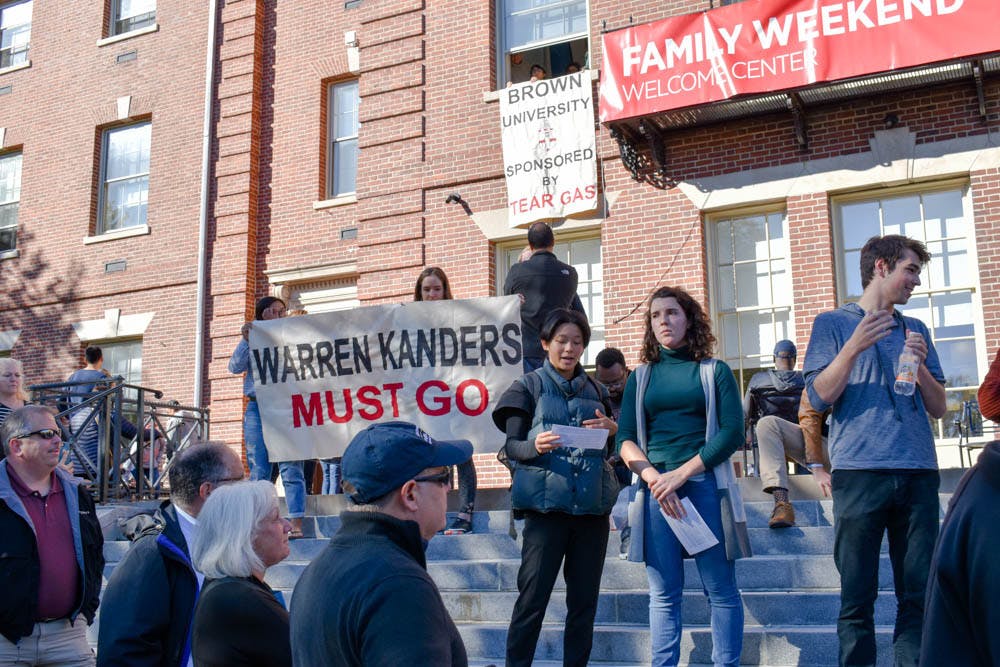Safariland Group — a company led by University alum and donor Warren Kanders ’79 P’23 — announced June 9 that it will divest from its Defense Technology and Monadnock divisions, which are responsible for producing crowd-control weapons such as tear gas. The division sold products to law enforcement and military agencies.
Kanders, the CEO of Safariland, is a member of the advisory council for the Institute at Brown for Environment and Society, and together with his wife, Allison Kanders, has funded a lecture series for the Brown Arts Initiative since 2017.
The decisions came in the midst of nationwide protests following the death of George Floyd at the hands of a white police officer, in which tear gas manufactured by Safariland has been used by police officers against peaceful protesters. Kanders did not cite tear gas use at the protests as a reason for divestment — only noting that selling these divisions of the company would give Safariland the opportunity to focus instead on "passive defensive protection" products, including bulletproof vests.
Activists have campaigned for years to remove Kanders from positions at powerful institutions for his involvement in the sale of tear gas and other military tactical equipment.
Some of these efforts have led to success, namely when, last summer, Kanders stepped down as the vice chairman of the Whitney Museum of American Art due to protests over Safariland’s sale of tear gas.
Organizations and student groups at Brown, including Warren Kanders Must Go and Brown Divest, have been calling for the University to cut ties with Kanders for over two years. Warren Kanders Must Go advocates for Kanders’ resignation or removal from his positions at Brown. Brown Divest includes Safariland on a list of nine companies they demand Brown divest from due to the companies' alleged complicity in human rights abuses against Palestinians.
Despite Safariland’s divestment, many continue to call for Kanders to cease all involvement with the University.
Warren Kanders Must Go will continue to urge the University to redirect and refuse gifts from Kanders, according to Tamara Rudic ’21, an organizer within the group.
“Our demands were more Brown-specific, just completely cutting ties with him, and some kind of an ethical gift policy which we really don’t have at all,” Rudic said. “Those still stand.”
Anchita Dasgupta ’21, a member of Brown Divest, said the group will also continue to call on Brown to divest from Safariland.
At press time, Kanders had not responded to requests for comment.
Graduate students from the Africana Studies, Sociology and Anthropology departments were among those to call for the University to sever ties with Kanders in statements on the Black Lives Matter movement and police brutality.
The Sociology graduate students’ statement will still call for Kanders to cut ties with the University following the company's divestment, Prabhdeep Singh Kehal PhD ’21 told The Herald. Graduate students within the Africana Studies department declined to comment.
Mayo Saji ’20, a former organizer with Warren Kanders Must Go, was interested that Kanders “doesn’t want his name attached to those specific weapons anymore.” But she added that “he has a long way to go,” and called on him to “recognize the history of the damage he’s caused,” by potentially giving “the money he’s accrued and profited from these weapons back to the communities that he’s hurt and affected.”
Kehal said that Kanders still profited from the sale of tear gas and other crowd control weapons and “simply saying you’re sorry for doing something bad but doing nothing to fix the harm that you’ve done is a hollow apology.” Kehal echoed Saji’s call for some form of monetary effort from Kanders, specifically by redirecting profits to communities that have been harmed.
“We have evidence that the same tear gas is used against migrants in Tijuana and is continuously used in Gaza and the West Bank,” Dasgupta said. “He has never apologized for the fact that he’s profiting off these things.”
Dasgupta also expressed concern that despite Safariland's recent divestment, other governments across the world still have access to Safariland’s products, which could be used on peaceful protesters.
Rudic reiterated this concern. “He’s not getting rid of (the divisions that make crowd control products), he was just selling it off to someone else,” she said.
“These products will be out there and they’re still being used … by police forces against protesters all around the world," Rudic stressed. "This whole company is basically founded on supporting a militarized police," she noted, adding, "he's still helping militarize police even if he’s not giving them tear gas."
While the Safariland internal divestment has not changed many student groups’ calls for the University to end relations with Kanders, some hope that the internal divestment from a tear gas producer can help push forward conversations about policing. “It’s exciting … there’s more space for talking about greater questions of police abolition and about how even around here, all these connections can be made between DPS and investment by people like Kanders,” Saji said.

ADVERTISEMENT




